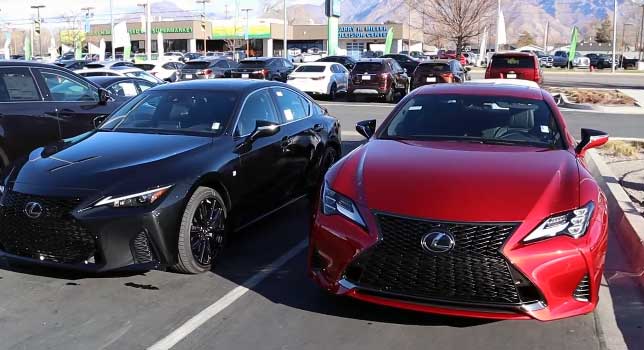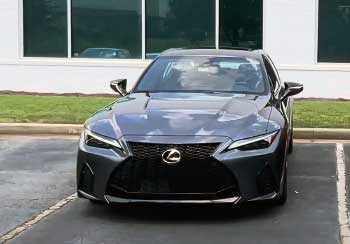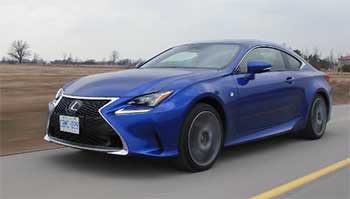As a car enthusiast who’s spent countless hours behind the wheel of luxury vehicles, I’ve always been drawn to Lexus for its blend of performance, comfort, and style. Today, I’m putting two of their standout models head-to-head: the Lexus IS and the Lexus RC. My goal is to break down their strengths, weaknesses, and unique vibes to help you decide which one fits your driving dreams. Whether you’re craving a sporty sedan or a sleek coupe, this comparison will guide you through their key features, pros, cons, and more, all from my firsthand perspective.

Comparison Table of Lexus IS vs. Lexus RC
| Feature | Lexus IS | Lexus RC |
| Body Style | Compact sedan (4-door) | Compact coupe (2-door) |
| Base Price (2025) | ~$41,000 (IS 300) | ~$44,000 (RC 300) |
| Engine Options | 2.0L Turbo I4, 3.5L V6, 5.0L V8 (IS 500) | 2.0L Turbo I4, 3.5L V6, 5.0L V8 (RC F) |
| Horsepower | 241-472 hp | 241-472 hp |
| Drivetrain | RWD or AWD | RWD or AWD |
| Fuel Economy (mpg) | 21 city / 31 hwy (IS 300) | 21 city / 31 hwy (RC 300) |
| Seating Capacity | 5 | 4 |
| Cargo Space | 10.8 cu. ft. (trunk) | 10.4 cu. ft. (trunk) |
| Infotainment | 8-inch touchscreen (standard), 10.3-inch opt. | 8-inch touchscreen (standard), 10.3-inch opt. |
| Safety Features | Lexus Safety System+ 3.0 | Lexus Safety System+ 3.0 |
| 0-60 mph | 5.6-4.5 sec (model dependent) | 5.8-4.4 sec (model dependent) |
| Warranty | 6-yr/70,000-mile powertrain | 6-yr/70,000-mile powertrain |
My Journey with Luxury Sedans and Coupes
I’ve always been fascinated by the luxury car segment, where style meets substance, and Lexus has consistently caught my eye. Sedans like the IS offer practicality with a sporty edge, perfect for daily commutes or long drives, while coupes like the RC scream personality and flair, designed for those who want to stand out. Over the years, I’ve test-driven both types, from zipping through city streets to cruising winding backroads.
Comparing the Lexus IS and RC feels personal because they represent two sides of the same coin: performance-driven luxury with distinct purposes. Let’s explore what makes each shine and where they falter.
Lexus IS Overview
The Lexus IS is a compact luxury sedan that’s been a staple in the brand’s lineup since the early 2000s. I first drove one a few years back, and it left an impression with its sharp handling and plush interior. For 2025, the IS continues to deliver a refined ride with a focus on driver engagement.

It’s available in multiple trims, starting with the IS 300 (241 hp, 2.0L turbo inline-4), moving up to the IS 350 (311 hp, 3.5L V6), and topping out with the IS 500 F Sport Performance (472 hp, 5.0L V8).
Whether you opt for rear-wheel drive (RWD) or all-wheel drive (AWD), the IS feels nimble yet composed.
The interior is a cozy sanctuary, with premium materials like NuLuxe or leather upholstery and a driver-centric cockpit. The Lexus Safety System+ 3.0, standard across all trims, includes features like adaptive cruise control, lane departure alert, and pre-collision braking. I love how the IS balances practicality—five seats, decent trunk space—with a sporty soul, especially in the IS 500, which roars like a muscle car but cruises like a luxury sedan.
Lexus RC Overview

The Lexus RC, on the other hand, is a compact coupe that prioritizes style and performance over practicality.
My first encounter with the RC was at a car show, where its bold spindle grille and sleek lines stole the spotlight. For 2025, the RC lineup mirrors the IS in engine options: RC 300 (241 hp, 2.0L turbo inline-4), RC 350 (311 hp, 3.5L V6), and the high-performance RC F (472 hp, 5.0L V8).
Like the IS, it offers RWD or AWD, but its two-door design gives it a sportier, more aggressive stance.
Inside, the RC feels intimate, with snug rear seats and a focus on the driver and front passenger. The infotainment system matches the IS, with an 8-inch or optional 10.3-inch touchscreen, and the same Lexus Safety System+ 3.0 keeps you protected. The RC’s appeal lies in its head-turning design and thrilling dynamics, especially in the RC F, which feels like a track-ready beast tamed for the road.
Pros of the Lexus IS
Let’s talk about why the IS might steal your heart. First, its versatility is a major win. With seating for five and a slightly roomier trunk (10.8 cu. ft.), it’s practical enough for daily errands or family road trips. I’ve loaded up an IS with groceries and weekend bags without breaking a sweat, something you’d struggle with in a coupe. The base IS 300 is also more affordable, starting around $41,000, making it an accessible entry into the luxury sedan market.
The IS 500 F Sport Performance is a standout for enthusiasts like me. Its 472-hp V8 delivers a 0-60 mph sprint in about 4.5 seconds, rivaling some sports cars. The adaptive suspension and precise steering make it a joy on twisty roads, while the quiet cabin ensures comfort on long drives. Plus, Lexus’s reliability is legendary—J.D. Power consistently ranks it high, and my own experience with Lexus vehicles confirms they’re built to last.
The tech suite is another plus. The Lexus Safety System+ 3.0 feels like a vigilant co-pilot, and the optional Mark Levinson audio system (17 speakers, 1,800 watts) turns every drive into a concert. For those who value a balance of performance, comfort, and practicality, the IS is tough to beat.
Cons of the Lexus IS
But the IS isn’t flawless. The rear seats, while functional, are cramped for taller passengers. I once had friends in the back during a group outing, and they weren’t thrilled after an hour. The infotainment system, though improved for 2025, still uses a touchpad in some trims, which I find clunky compared to a full touchscreen. Cargo space, while decent, lags behind competitors like the BMW 3 Series (13.0 cu. ft.).
The base IS 300’s 241-hp engine feels adequate but not exhilarating, especially if you’re used to punchier rivals like the Audi A4. And while the IS 500 is a beast, its fuel economy (17 city/25 hwy) might make you wince at the pump. Lastly, the design, though sharp, feels less bold than the RC’s, which might not turn heads as much as you’d like in a luxury sedan.
Pros of the Lexus RC
The RC’s biggest strength is its undeniable style. Driving one feels like making a statement—its aggressive grille and sleek profile draw eyes everywhere. I’ve had strangers ask about it at gas stations, something that rarely happens with the IS. The RC F, with its 472-hp V8, matches the IS 500’s performance but feels more visceral in a coupe body, hitting 0-60 mph in about 4.4 seconds.
The interior is a highlight, with premium materials and a driver-focused layout that makes you feel like you’re in a cockpit. The F Sport trims add sporty touches like bolstered seats and aluminum pedals, enhancing the thrill. Like the IS, the RC benefits from Lexus’s stellar reliability and safety tech, including the same Lexus Safety System+ 3.0 suite. If you prioritize style and a sporty driving experience, the RC delivers in spades.
Cons of the Lexus RC
The RC’s biggest drawback is its lack of practicality. With only four seats and a tight rear row, it’s not ideal for carrying passengers. I tried fitting two friends in the back once, and it was a squeeze even for a short ride. The trunk (10.4 cu. ft.) is slightly smaller than the IS’s, making it less versatile for luggage or gear. The RC’s starting price (~$44,000) is also higher than the IS’s, which might sting for budget-conscious buyers.
The infotainment system shares the IS’s shortcomings, with the touchpad feeling dated. While the RC F is a performance star, the base RC 300 can feel underpowered, especially compared to rivals like the BMW 4 Series. Fuel economy mirrors the IS’s, with the RC F guzzling gas at 16 city/24 hwy. If you need a car for more than just you and a passenger, the RC might feel limiting.
Driving Experience Comparison
Behind the wheel, the IS and RC offer distinct vibes. The IS feels like a refined daily driver with a sporty edge. Its suspension soaks up bumps well, and the steering is precise, making it ideal for both city commutes and spirited drives. I took an IS 350 on a mountain road last summer, and it handled curves with confidence, though the base model’s softer setup prioritizes comfort over aggression.
The RC, by contrast, feels more visceral. Its lower stance and stiffer suspension (especially in F Sport trims) make it hug corners tightly, giving it a true sports car feel. I drove an RC F on a track day, and its raw power and throaty exhaust were intoxicating. However, the RC’s firmer ride can feel harsh on rough roads, and its two-door design makes parking lots less forgiving. For pure driving thrills, the RC edges out; for all-around comfort, the IS takes the lead.
Interior and Comfort Comparison
Inside, both cars pamper you with Lexus’s signature craftsmanship. The IS’s cabin feels airy, with more legroom for front passengers (44.8 inches vs. RC’s 45.4 inches, a slight edge for the RC). The IS’s rear seats, though tight (32.2 inches of legroom), are more usable than the RC’s (27.3 inches). I found the IS’s seats comfier for long drives, especially with the optional ventilated leather.
The RC’s interior, while equally luxurious, feels more intimate. Its sloping roofline and snug rear seats create a cocoon-like vibe, perfect for couples or solo drives. The optional Mark Levinson audio system sounds just as crisp in the RC, but the coupe’s smaller windows make it feel darker. If you value space and versatility, the IS wins; if you want a sporty, intimate cabin, the RC is your pick.
Technology and Safety Comparison
Both models share Lexus’s tech suite, so there’s little difference here. The standard 8-inch touchscreen (upgradable to 10.3 inches) supports Apple CarPlay and Android Auto, though I find the interface less intuitive than BMW’s iDrive. The Lexus Safety System+ 3.0 is a highlight, with features like lane-keeping assist and adaptive cruise control that work seamlessly in both cars. I tested the pre-collision system in the IS during a sudden stop, and it reacted swiftly, boosting my confidence.
The RC’s optional head-up display feels more immersive due to the coupe’s driver-focused design, but both cars offer similar tech packages. Reliability is a shared strength—Lexus’s track record means you’re unlikely to deal with glitchy systems in either.
Performance and Handling Comparison
Performance is where both cars shine, but they cater to different tastes. The IS 300 and RC 300 share a 241-hp turbo inline-4, which is fine for daily driving but lacks the punch of higher trims. The IS 350 and RC 350, with their 311-hp V6, feel livelier, hitting 0-60 mph in about 5.6 seconds (IS) and 5.8 seconds (RC). The IS 500 and RC F, both with 472-hp V8s, are the stars, offering near-identical acceleration (4.5 vs. 4.4 seconds).
I found the IS’s handling more forgiving, ideal for mixed driving conditions. The RC, especially the RC F, feels sharper in corners but less comfortable on long hauls. If you’re after track-day thrills, the RC F’s stiffer chassis and sport-tuned suspension give it an edge. For a balanced ride, the IS 500 matches performance with better daily drivability.
Discover More: Lexus IS 350 vs. IS 500
Fuel Economy and Efficiency
Fuel economy is nearly identical between the two. The IS 300 and RC 300 both get about 21 city/31 highway mpg, solid for the class. The IS 350 and RC 350 drop to 20 city/28 highway, while the IS 500 and RC F are thirstier at 17 city/25 highway and 16 city/24 highway, respectively. I noticed the IS 300’s efficiency during a road trip, stretching fuel stops farther than expected. Hybrids aren’t available for either in 2025, so if eco-friendliness is key, you might look at Lexus’s UX or RX models instead.
Price and Value Comparison
The IS starts at around $41,000 for the IS 300, while the RC begins at $44,000 for the RC 300. Higher trims like the IS 500 ($60,000) and RC F ($68,000) push the price up significantly. I appreciate the IS’s lower entry point, which offers more value for practical buyers. The RC’s higher cost reflects its premium styling and sportier setup, but it’s less versatile for the price.
Both cars hold strong resale value, thanks to Lexus’s reliability reputation. The IS’s lower starting price and five-seat capacity make it a better deal for most, but the RC’s unique style justifies its cost for those prioritizing aesthetics.
Which Should You Choose?
Choosing between the IS and RC depends on your lifestyle. If you need a practical yet sporty luxury car for daily driving, the IS is the smarter pick. Its extra seats, slightly larger trunk, and lower price make it versatile without sacrificing performance, especially in the IS 500. I’d recommend it for families or those who value comfort and utility.
The RC, however, is for those who crave style and driving thrills over practicality. Its bold design and coupe dynamics make every drive feel special, especially in the RC F. If you’re a solo driver or couple who loves turning heads, the RC is your match. Personally, I lean toward the IS for its all-around appeal, but the RC’s charisma is hard to resist.
Consider Vehicle Longevity: Xpel Ceramic Coating
Frequently Asked Questions
No, the Lexus RC is a two-door coupe, while the IS is a four-door sedan. They share engines and tech but differ in body style and practicality.
The RC is slightly longer (184.8 inches vs. IS’s 185.1 inches) but has less interior space due to its two-door design and smaller rear seats.
RC stands for “Radical Coupe,” reflecting its bold, sporty design aimed at challenging hybrid coupe perceptions, per Lexus’s naming convention.
Conclusion
After spending time with both the Lexus IS and RC, I’m confident you’ll find a model that speaks to your driving style. The IS offers a practical yet thrilling ride, perfect for those who need versatility without losing the luxury edge. The RC, with its head-turning looks and sporty soul, is ideal if you want to make every drive an event. Weigh your priorities—space versus style, utility versus flair—and test-drive both to feel the difference. Whichever you choose, Lexus’s blend of quality and performance won’t disappoint.

